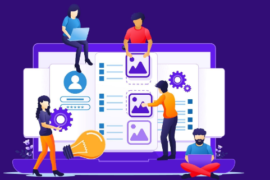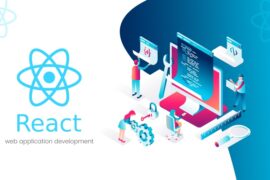The landscape of software development is constantly evolving, shaped by technological advancements and changing user demands. As we step into 2023, a host of trends are emerging that have the potential to revolutionize the industry. Here are the top 7 software development trends to watch out for:
Article Highlights:
- Rapid advancements in technology are driving software development trends in 2023.
- Developers are focusing on enhancing user experiences, security, and sustainability.
- Artificial Intelligence (AI), DevOps, and Low-Code Development are dominating the landscape.
- Companies are adopting edge computing and quantum computing for unparalleled performance.
- Ethical considerations are gaining importance, leading to more responsible software practices.
- Cross-platform development and containerization are streamlining workflows.
- Bangalore continues to be a hub for top-notch software development companies.
1. Artificial Intelligence (AI) Integration
AI is no longer a novelty; it’s becoming a fundamental part of software development. From chatbots enhancing customer support to AI-driven data analysis, machine learning algorithms are transforming how applications function and interact with users.
2. DevOps Transformation
DevOps continues to gain traction as organizations seek faster, more efficient software delivery. The integration of development and operations teams streamlines the development lifecycle, fostering continuous integration, continuous delivery (CI/CD), and automated testing.
3. Low-Code Development
In a bid to increase development speed and efficiency, low-code platforms are gaining popularity. These platforms enable developers to create applications with minimal hand-coding, making software development accessible to a broader range of professionals.
4. Edge and Quantum Computing
Edge computing, bringing computation closer to data sources, improves real-time processing. Quantum computing, on the other hand, offers unparalleled computational power, promising breakthroughs in solving complex problems that were previously infeasible.
5. Ethical Software Development
With the increasing influence of technology on society, ethical considerations are gaining prominence. Developers are focusing on building software that respects user privacy, ensures data security, and addresses potential biases in AI algorithms.
6. Cross-Platform Development
The demand for applications across various devices and platforms is pushing developers to adopt cross-platform development frameworks. This approach streamlines development efforts, saving time and resources.
7. Containerization and Microservices
Containerization technologies like Docker are revolutionizing how applications are deployed and managed. Microservices architecture, combined with containers, offers scalability, resilience, and flexibility in software development.
In a tech-savvy city like Bangalore, software development is a thriving industry. Here are the top 5 software development companies in Bangalore that are at the forefront of innovation:
Top Software Development Companies in Bangalore
| Company Name | Website |
|---|---|
| Infosys | www.infosys.com |
| Wipro | www.wipro.com |
| Tech Mahindra | www.techmahindra.com |
| Mindtree | www.mindtree.com |
| Mphasis | www.mphasis.com |
These software development company in Bangalore have a proven track record of delivering cutting-edge software solutions and contributing to the technological advancement of the industry.
FAQs about Software Development Trends in 2023
Q1: Why is AI integration considered a significant trend in software development?
A1: AI integration is a significant trend because it enhances user experiences, automates tasks, and enables predictive analytics. It allows applications to understand user behavior, personalize interactions, and provide real-time insights, ultimately leading to more engaging and intelligent software solutions.
Q2: How does DevOps transformation benefit software development processes?
A2: DevOps transformation fosters collaboration between development and operations teams, leading to faster delivery of software updates, reduced errors, and improved software quality. This approach emphasizes automation, continuous integration, and continuous delivery, ensuring seamless deployment and efficient response to changing user needs.
Q3: What is low-code development, and why is it gaining popularity?
A3: Low-code development involves using platforms that require minimal hand-coding to build applications. It’s gaining popularity due to its ability to accelerate development, enabling a wider range of professionals to create software without extensive coding knowledge. This speeds up project timelines and enhances overall efficiency.
Q4: What role does edge computing play in software development?
A4: Edge computing brings computational resources closer to data sources, reducing latency and improving real-time processing. This trend is essential for applications that require quick response times, such as IoT devices, and it enhances user experiences by delivering faster and more reliable services.
Q5: How does ethical software development impact the industry?
A5: Ethical software development addresses concerns about user privacy, data security, and fairness in AI algorithms. This trend emphasizes responsible coding practices that consider potential biases, ensure data protection, and respect user rights. It reflects the industry’s commitment to building technology that benefits society as a whole.
Q6: What advantages does cross-platform development offer?
A6: Cross-platform development allows developers to create applications that can run on multiple devices and operating systems. This approach reduces development efforts and costs, as developers can write code once and deploy it across different platforms, reaching a broader audience with minimal additional work.
Q7: How do containerization and microservices impact software development?
A7: Containerization, enabled by technologies like Docker, simplifies application deployment and management. Microservices architecture, combined with containers, enables modular development, scalability, and easy updates. This approach allows developers to build and scale applications more efficiently, adapting to changing user demands.
Q8: Why is Bangalore a hub for software development companies?
A8: Bangalore has a robust technology ecosystem, with a skilled workforce, educational institutions, and a history of innovation. The city’s software development companies benefit from this ecosystem, making it an attractive destination for both established tech giants and emerging startups.
In conclusion, 2023 is set to witness remarkable transformations in the software development landscape. As AI, DevOps, low-code development, and other trends shape the industry, it’s crucial for developers and businesses to stay updated and adapt to these changes. With Bangalore’s software prowess, the city remains a hotspot for innovation, attracting both established companies and startups alike.




